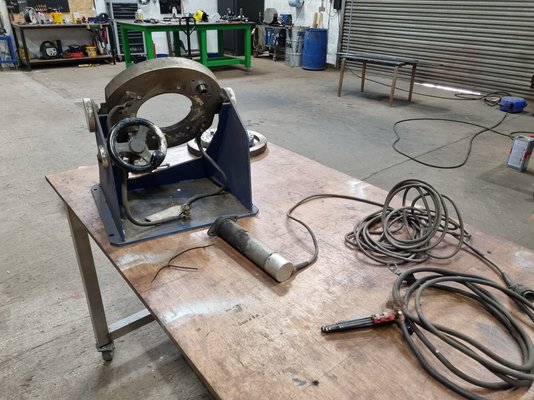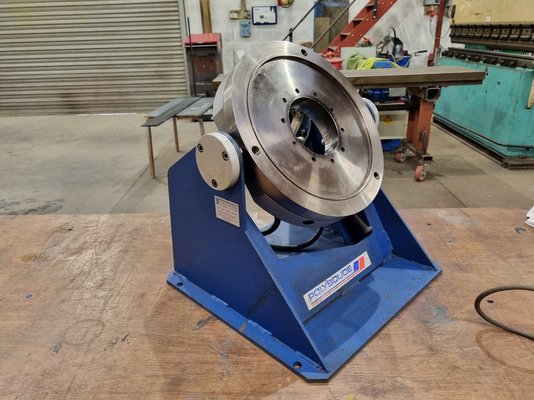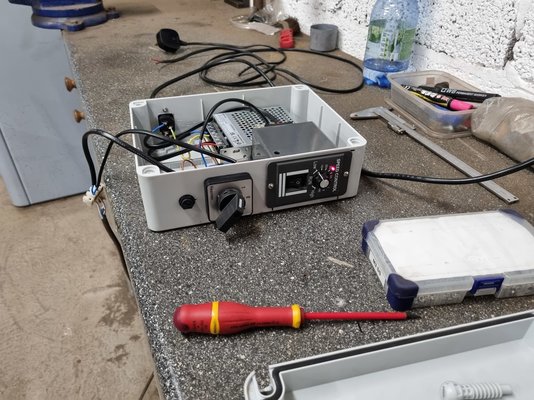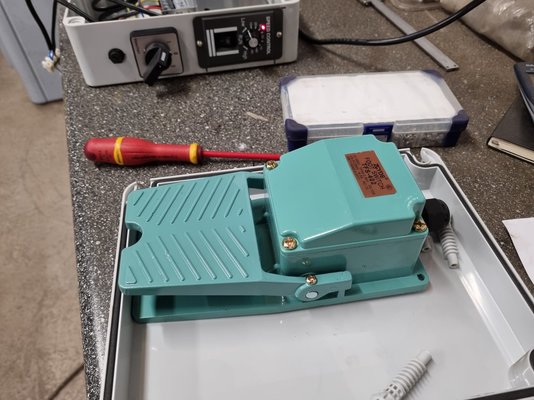Munkul
Jack of some trades, Master of none
- Messages
- 7,866
- Location
- Cumbria
so... I have a 40V DC motor on this welding positioner I've just bought. Originally it was powered by an automatic welding power source with an encoder for feedback. I just want to power it and make it variable speed.
It is a Dunkermotoren GR53x57 nominally rated at 1.9A and fault current at 20A.
I already have a suitable PWM speed controller, tried and tested on a 24v motor, it's rated up to 60v and 10a. I'll protect the motor with a 2 amp fuse, if I can't limit it via the supply.
So I need a power supply.
Finding a switched mode or linear power supply rated at 40V for under £100 seems to be a fruitless task. All I can find are 36V and 48V supplies.
So... I'm wondering, could I just feed it 36v and accept the small increase in working current? Or is this a silly idea? I certainly don't want to burn it out, it's an expensive German motor. I also don't want to under-power the positioner.
Similarly, 48v sounds like a bad idea too.... unless I can get an adjustable PSU and manage to turn it down far enough... OR is it? given that it's going through a PWM controller...
Lastly, I could just buy a lab adjustable power supply and run it off that, but it's not cheap and it seems like a waste, when I just want to build a neat little enclosure with the supply and controller, 240v in, and a socket/plug for a foot switch.
Any suggestions?
It is a Dunkermotoren GR53x57 nominally rated at 1.9A and fault current at 20A.
I already have a suitable PWM speed controller, tried and tested on a 24v motor, it's rated up to 60v and 10a. I'll protect the motor with a 2 amp fuse, if I can't limit it via the supply.
So I need a power supply.
Finding a switched mode or linear power supply rated at 40V for under £100 seems to be a fruitless task. All I can find are 36V and 48V supplies.
So... I'm wondering, could I just feed it 36v and accept the small increase in working current? Or is this a silly idea? I certainly don't want to burn it out, it's an expensive German motor. I also don't want to under-power the positioner.
Similarly, 48v sounds like a bad idea too.... unless I can get an adjustable PSU and manage to turn it down far enough... OR is it? given that it's going through a PWM controller...
Lastly, I could just buy a lab adjustable power supply and run it off that, but it's not cheap and it seems like a waste, when I just want to build a neat little enclosure with the supply and controller, 240v in, and a socket/plug for a foot switch.
Any suggestions?






 I tested out the motor last night with the 24v supply I had on hand. The PWM controller worked great near the top end, but didn't have any umph down low. I'm guessing this is because there wasn't enough voltage to drive it at the low speed. But at full speed (24v) it did 1rpm on the turntable nearly exactly. This makes me think it has the 1:225 ratio gearbox which gives a turntable speed range of 0.07 to 1.4 rpm. Quite slow for small stuff, but pretty decent for around 50mm diameter upwards on TIG. Was plenty torquey, although I didn't want to push it as I hadn't put any overcurrent protection in.
I tested out the motor last night with the 24v supply I had on hand. The PWM controller worked great near the top end, but didn't have any umph down low. I'm guessing this is because there wasn't enough voltage to drive it at the low speed. But at full speed (24v) it did 1rpm on the turntable nearly exactly. This makes me think it has the 1:225 ratio gearbox which gives a turntable speed range of 0.07 to 1.4 rpm. Quite slow for small stuff, but pretty decent for around 50mm diameter upwards on TIG. Was plenty torquey, although I didn't want to push it as I hadn't put any overcurrent protection in.



